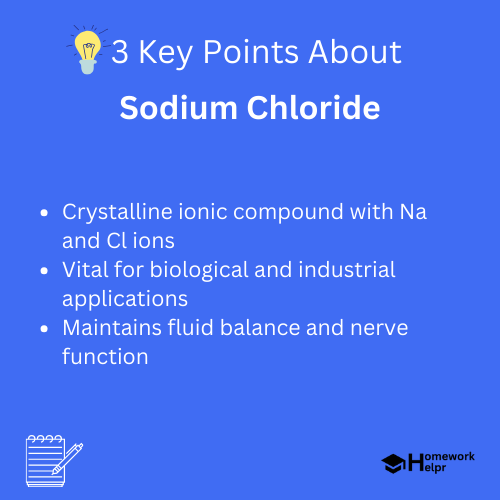📝 Summary
Sodium Chloride, known as table salt, is a crucial ionic compound made of sodium and chloride ions. Its chemical formula is NaCl, consisting of one sodium ion and one chloride ion that bond in a cubic lattice structure. Sodium Chloride has essential functions in the human body, such as maintaining fluid balance, enabling nerve function, and regulating pH balance. Additionally, it plays vital roles in industrial applications like chemical production and food preservation, highlighting its significance in daily life and health.
Sodium Chloride: The Essential Compound
Sodium Chloride, commonly known as table salt, is a crystalline ionic compound essential for various biological and industrial applications. Composed of sodium (Na) and chloride (Cl) ions, it holds significance beyond just seasoning our food. In this article, we will explore its chemical structure, properties, functions, and various applications.
Chemical Structure of Sodium Chloride
The chemical formula of Sodium Chloride is NaCl. It represents one sodium ion and one chloride ion, which bond together in a strong ionic bond. The sodium ion has a positive charge (Na+), while the chloride ion has a negative charge (Cl–), resulting in a neutral compound overall.
The structure of Sodium Chloride can be represented as a cubic lattice. Each sodium ion is surrounded by six chloride ions, while each chloride ion is similarly surrounded by six sodium ions, forming a repeating three-dimensional grid. This geometric arrangement results in the characteristic cubic crystals of salt.

Definition
Ionic Compound: A compound made up of ions that are held together by ionic bonds.
Examples
Imagine a cube made of small balls, where each ball represents a sodium or chloride ion. This cube represents the arrangement in Sodium Chloride.
Properties of Sodium Chloride
Sodium Chloride has several distinct properties that make it unique. Some of these properties include:
- Solubility: It is highly soluble in water, making it accessible for various chemical reactions.
- Melting Point: Sodium Chloride has a high melting point of around 801 °C (1474 °F), which is crucial for its stability across different temperatures.
- Taste: It has a characteristic salty taste, which enhances the flavor of food.
These properties make Sodium Chloride a versatile compound used in numerous ways, from cooking to industrial applications.
Definition
Solubility: The ability of a substance to dissolve in a solvent to form a solution.
Examples
Think of sugar dissolving in water; the same happens with Sodium Chloride, allowing it to flavor your food effectively.
Functions of Sodium Chloride in the Human Body
Sodium Chloride plays a fundamental role in various physiological processes in the human body. Some key functions include:
- Fluid Balance: Sodium helps to maintain osmotic pressure, ensuring that cells retain the proper amount of water.
- Nerve Function: Sodium ions are crucial for transmitting nerve impulses and muscle contractions.
- pH Balance: Sodium Chloride helps maintain the body’s acid-base balance (pH), facilitating optimal metabolic functions.
Without adequate levels of Sodium Chloride, our bodies can suffer from imbalances that may lead to health issues.
Definition
Osmotic Pressure: The pressure required to prevent the flow of solvent into a solution through a semipermeable membrane.
Examples
When we sweat, we lose salt; drinking electrolyte fluids helps restore our Sodium Chloride levels for proper hydration.
Industrial Applications of Sodium Chloride
The versatility of Sodium Chloride extends beyond just culinary uses. Its applications in various industries include:
- Chemical Production: It is used as a raw material for producing chlorine, caustic soda, and other chemicals.
- Water Treatment: Sodium Chloride is utilized in water softening processes, removing minerals that cause hardness.
- Food Preservation: It acts as a preservative by inhibiting bacterial growth, extending the shelf life of food items.
These applications showcase how Sodium Chloride is an essential compound in both everyday life and industry.
Definition
Raw Material: A basic material from which goods are made or manufactured.
Examples
Many companies make chlorine and other essential chemicals using Sodium Chloride as one of the initial materials in production.
Fun Fact About Sodium Chloride
❓Did You Know?
Did you know that Sodium Chloride has been used as a form of currency in ancient times? In fact, Roman soldiers were sometimes paid with salt!
Health Considerations
While Sodium Chloride is essential for our health, excessive consumption can lead to health problems. High levels of sodium can contribute to:
- Hypertension: High blood pressure is associated with various cardiovascular diseases.
- Kidney Problems: An overload of sodium may lead to kidney dysfunction.
- Osteoporosis: Excessive salt consumption has been linked to bone health issues due to calcium loss.
Maintaining a balanced intake of Sodium Chloride is key to ensuring good health without the risks associated with high consumption.
Definition
Hypertension: A condition where the blood pressure in the arteries is persistently elevated.
Examples
Monitoring sodium intake, especially in fast foods, can help maintain a healthy blood pressure level.
Summary
Sodium Chloride is more than just a common seasoning. Its unique chemical properties, vital functions in the human body, and wide-ranging industrial applications highlight its importance in our daily lives. Understanding the dual role of Sodium Chloride as both beneficial and potentially harmful when consumed in excess is essential for maintaining a healthy lifestyle.
In conclusion, Sodium Chloride is a remarkable compound, crucial for both biological functions and various industries. By recognizing its significance and adhering to appropriate intake levels, we can enjoy its benefits while minimizing health risks. Remember, the next time you sprinkle salt on your food, you’re tapping into a compound that has been invaluable throughout history!
Related Questions on Sodium Chloride
What is Sodium Chloride commonly known as?
Answer: Table salt is the common name for Sodium Chloride.
What is the chemical formula of Sodium Chloride?
Answer: The chemical formula of Sodium Chloride is NaCl.
What properties make Sodium Chloride unique?
Answer: High solubility and a characteristic salty taste.
What health issues can arise from excessive sodium intake?
Answer: Excess intake may lead to hypertension and kidney problems.
